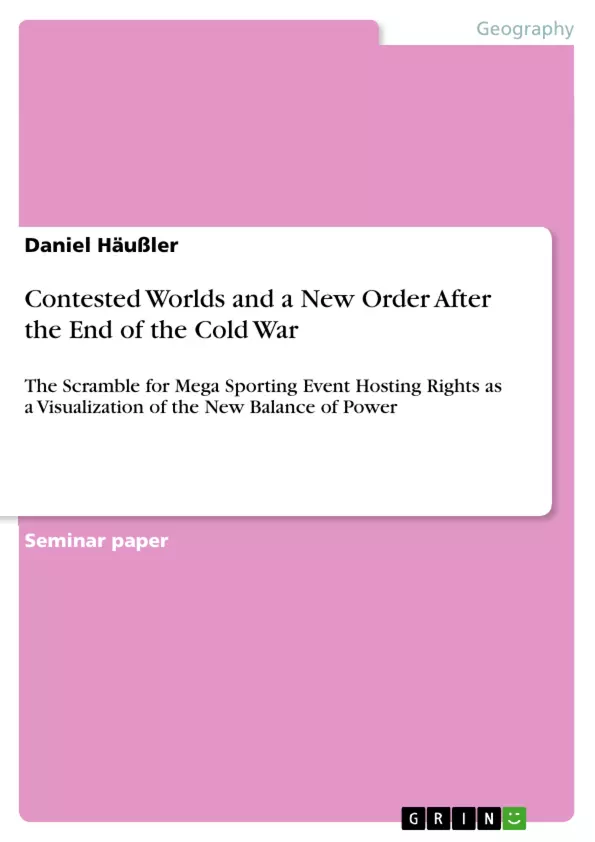This case study addresses to the task of visualizing and describing the shifts in global politics by comparing two time periods: the Cold War and the era after the end of the Cold War.
The entirely new approach uses the awarding of mega sporting events hosting rights as an allegory for the political importance of a country. The more organizations a country is selected for, the more powerful is the relative voice on global level of politics. The most substantial argument in favour of this simplifying method is constituted in the easy and prompt access to the data due to visualizing maps. Moreover, classifying results of several countries, made by Peter Vujakovic in 2005, will be compared to the interpretation of the results of this case study.
With the help of this comprehensible approach one can see the topic from a different angle, and it helps to forecast the prospective development of global proportion of power. As a base, the literature research deals with an analysis of the world order during the Cold War and the shifts after the collapse of the Soviet Union.
The illustration of the meaning and the background of mega sporting events completes the theoretical part.
Inhaltsverzeichnis (Table of Contents)
- INTRODUCTION
- METHODOLOGY
- THE THEMATIC FRAMEWORK
- POST-COLD WAR WORLD ORDER
- THE BACKGROUND AND MEANING OF MEGA SPORTING EVENTS
- THE ASSOCIATIONS OF THE FOOTBALL WORLD CHAMPIONSHIP AND THE OLYMPIC GAMES: THE FIFA AND THE IOC
- THEORETICAL PERSPECTIVE - A SUMMARY OF PETER VUJAKOVIC'S TEXT
- CONNECTION BETWEEN THEORY AND PRACTICE: THE ANALYSIS OF THE SELECTION OF HOST COUNTRIES
- DURING COLD WAR: 1960 - 1990
- POST-COLD WAR: 1992 - 2022
- KEY FINDINGS
- CONCLUSION
Zielsetzung und Themenschwerpunkte (Objectives and Key Themes)
This case study analyzes the shifting global political landscape by comparing the Cold War and post-Cold War eras. It uses the awarding of mega sporting event hosting rights as a metaphor for a country's political influence, with the premise that the more organizations a country is selected for, the stronger its relative voice on the global political stage.
- Analyzing the global power structure during the Cold War and post-Cold War periods.
- Exploring the significance of mega sporting events as indicators of political influence.
- Identifying key shifts in global power dynamics through the analysis of host country selection for mega sporting events.
- Examining the theoretical framework of the "Contested Worlds" perspective.
- Evaluating the influence of BRICS countries (Brazil, Russia, India, China, South Africa) in the post-Cold War world.
Zusammenfassung der Kapitel (Chapter Summaries)
The introduction outlines the emergence of a new post-Cold War order, characterized by a complex and evolving power hierarchy. It highlights the increasing competition for global political dominance, exemplified by conflicts like the Ukraine crisis and the FIFA corruption scandal. The study's aim is to demonstrate a new method for visualizing and analyzing global power shifts through the lens of mega sporting event hosting rights.
Chapter 5.1 focuses on the selection of host countries for mega sporting events during the Cold War era (1960-1990), offering insights into the prevailing power dynamics of the time. Chapter 5.2 then examines the selection of host countries in the post-Cold War era (1992-2022), highlighting key changes in global power structures. Chapter 5.3 presents the key findings of this analysis, revealing how the global proportion of power has shifted, identifying countries that have gained or lost influence in the post-Cold War world.
Schlüsselwörter (Keywords)
This work focuses on the concepts of "Contested Worlds," post-Cold War order, global power dynamics, mega sporting events, host country selection, political influence, BRICS countries, and theoretical perspectives on geopolitics.
Frequently Asked Questions
How can mega sporting events indicate global political power?
Hosting rights for events like the Olympics or FIFA World Cup serve as an allegory for political importance; the more a country is selected, the more powerful its voice is considered on the global stage.
What are the main differences between Cold War and post-Cold War world orders?
The Cold War order was bipolar (USA vs. USSR), while the post-Cold War era is characterized by a "Contested Worlds" perspective with shifting power hierarchies and emerging new players.
Who are the BRICS countries and why are they significant?
BRICS stands for Brazil, Russia, India, China, and South Africa. They represent emerging economies that increasingly challenge traditional Western dominance in global politics and sports hosting.
What is Peter Vujakovic's contribution to this study?
Vujakovic's classification of countries and their geopolitical standing is used as a theoretical benchmark to compare the results of the sporting event host selection analysis.
What did the analysis of host countries between 1992 and 2022 reveal?
The analysis shows a shift in influence towards non-Western nations, reflecting the decentralization of power and the growing importance of emerging markets in the 21st century.
- Citar trabajo
- Daniel Häußler (Autor), 2015, Contested Worlds and a New Order After the End of the Cold War, Múnich, GRIN Verlag, https://www.grin.com/document/454917



